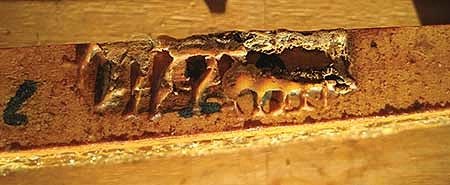
The Honey 'Bee-spoke plasterers’...
Now down to some really practical ‘bee spoke’ work – (the adjective 'bespoken' means 'ordered, commissioned, arranged for' and is first cited from 1607 - Ref: en.wikipedia.org/wiki/Bespoke) of course honey bees go back many thousands of years before this though, in keeping their homes, no matter where they decide to make them, ship shape and more naturally sterile, so the claim is made, than the average operating theatre.Deoxyribonucleic acid (DNA), carrying the genetic instructions used in the growth, development, functioning and reproduction of all known living organisms, awakens the adult honey bee’s (among other functions) ability to collect resins and compounds excreted by plants to form Propolis which, by using their ‘plastering’ ability, is spread over the entire interior of their hive. (An internet search reveals that collecting various fluids/resins from plants - such as latex from the rubber tree – maple syrup from the maple tree to drizzle over pancakes - frankincense treasured for its many beneficial qualities - has been an important part in human daily lives for a very long time.)
What is Propolis?
The ‘plaster’ that the bees collect to spread over every part of the hive, from the walls to the edge of the comb cells, is known as Propolis (from the Greek ‘pro’ - before and ‘polis’ - city). Propolis (pro-city) and functions, in this instance, as a protector.
Scientists have found raw Propolis to contain more than 150 compounds with some 50 – 70% being resins and balms. Bee wax amounts to about 30 – 50%. Pollen 5 – 10% and the remaining %age essential oils. The variations are due to different plants found in combination from one region to another, as well as changes during the year, to the amounts of resins available to be tapped by the bees.
Propolis with its wide variety of additional elements such as amino acids, vitamins, minerals and the important bioflavonoids helps to maintain a healthy immune system.
A search on the internet will point to various natural health benefits that Propolis offers both internally and as surface application.
Being malleable and sticky, Propolis is easily spread and built upon to also create protective walls, that serve to isolate the interior, with opening/s to the exterior that are small enough to provide access and a defence to any intruders trying to gain entrance to plunder stored food reserves that have taken many, many hours to build.
Besides the importance of having a ‘home’ that is healthy and secure there is the added need to be able to control the climate within which is done by using Propolis to construct barriers that conduct air to critical areas such as the brood area that needs to have CO2 levels at a minimum and areas that need to have nectar evaporated to honey consistency. Bees will, if needed, assist with the air draft by fanning their wings to increase flows.
We certainly are able to learn valuable lessons and information from bees so when you see someone ‘plastering’ think about the process and realise that bees do their plastering almost entirely in the dark...

